In no particular order. I started this post the day after International Woman’s Day, and I’ve wanted to finish it ever since. It’s just been on my mind. These are my fictional role models. International Woman’s Day, which came just before the 20th anniversary of the premire of Buffy the Vampire Slayer on March 10 (#buffyslays20), had me thinking about the women in fiction I’ve looked up to, as well as why. And when writing my quick post for International Woman’s Day, I’d included a photo of Carrie Fisher as Princess Leia, as well as wrote a brief tribute to her; it got me thinking of how much Leia changed my childhood, as well as how much Carrie Fisher will be missed. She meant a lot to so many people, for how she spoke up for women and the mentally ill, as well as body image issues. So, all these things together meant that I wanted to take some time to write this post.
Princess Leia, Star Wars. I talked about this in my last post, so I’ll try to keep it a little brief. Leia changed how I saw women in fiction; she certainly changed how I saw princesses. Suddenly, Cinderella and Aurora didn’t cut it anymore. Cinderella’s biggest goal was to go to the ball, spent time with the Prince for one evening, and he later could only identify her because she was apparently the only person in the kingdom with that particular shoe size. Aurora was raised by fairies and then spent a good deal of time in a coma (by the way, the Prince never got consent to kiss her, which essentially means that the movie romanticizes sexual assault, regardless of the in-universe reasons; IRL, we’d be disgusted). The feminist critiques and realistic movie titles are everywhere, but here’s a few of my favorites:
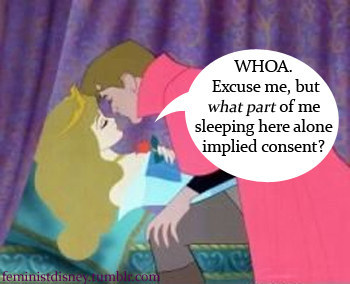
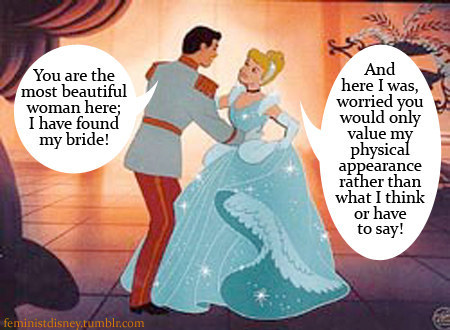
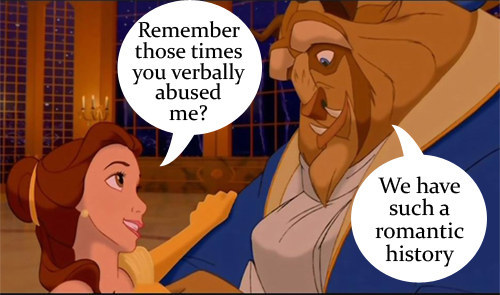
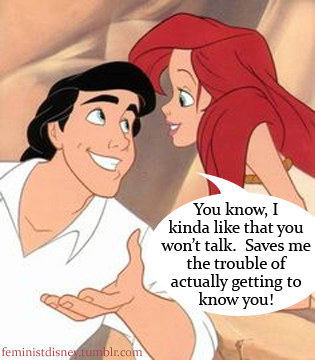
And then came Leia. Leia, who snuck a message to Obi-Wan Kenobi in R2-D2 with the plans for the Death Star. Leia, who survived the initial Stormtrooper attack, talked back to Vader and Tarkin, lied to their faces about being on a diplomatic mission, didn’t break even when witnessing the destruction of her planet and her loved ones, and withstood torture. Leia, who was a Rebel spy who took charge of her own rescue when Han and Luke couldn’t figure out how to get away. Leia, who helped lead the Resistance and who also fought herself. Leia, who withstood torture again, helped save her love interest, shook off getting shot, and, again, helped fight. She ended up becoming a General. Yes, these things are fiction. Are all of these things possible, in some real-world context, for one woman to do? I don’t know. But it’s not the “withstanding torture” and “sassing off to Darth Vader” parts that really inspire me. Sure, mouthing off to Darth Vader is a complete Moment of Awesome for her–not to mention lying to his face–but what inspires me is her strength. What inspires me is that she was a leader. Not once did a man say that he wouldn’t take orders from a woman; she told them what to do, and they did it, all without question or hesitation in regards to her gender. It was a non-issue, like it didn’t even occur to them that they were answering to a woman. No one felt emasculated, or complained of preferential treatment. Leia just gave orders, and people complied. Leia never gave up, and she was one of the bosses. And she also taught me that women could fight.
She was not looking for a hero; Han Solo would not have been a love interest for Cinderella. When Luke came to rescue her, the knight in shining armor, she lounged in that seat, arched an eyebrow, and questioned who in the world he was, instead of waxing poetic about how he saved her (this, after insulting him when she thought he was a Stormtrooper). She helped save herself. She spoke her own mind. Leia was not defined by her need for a man to save her. And when, ultimately, the boys gave into grief–Luke ran off to some isolated world, and Han left her to return to smuggling, she continued on. In a lot of ways, the Star Wars saga is about men who dropped the ball–Anakin, Luke, Han–and one woman who persisted. She stayed to fight the battle, regardless of her own personal issues, after losing her planet, her family, her brother, her husband, and her son. And, despite all the jokes about the Skywalker Whining Gene, she never whined or complained about any of it. Not once that we’ve ever seen. In many ways, Leia is the true hero of the Star Wars saga, because she kept the Rebellion alive, as well as the Resistance. The time that she was at her lowest wasn’t even when Vader was torturing her, in my opinion, because she still talked back to him. Her lowest was being forced into that metal bikini and chained to Jabba–because she was silent (Carrie Fisher hated that outfit and insisted on being the one to kill Jabba, not a stunt double). Carrie herself noted this once in an interview. Jabba forced her into a bikini and made her silent–and then she took the chains meant to enslave her and strangled the patriarchal slug with them. And did I mention she snuck into the palace dressed as a man and successfully bluffed Jabba, too?
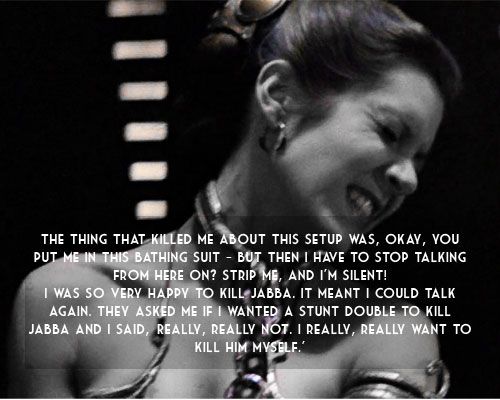
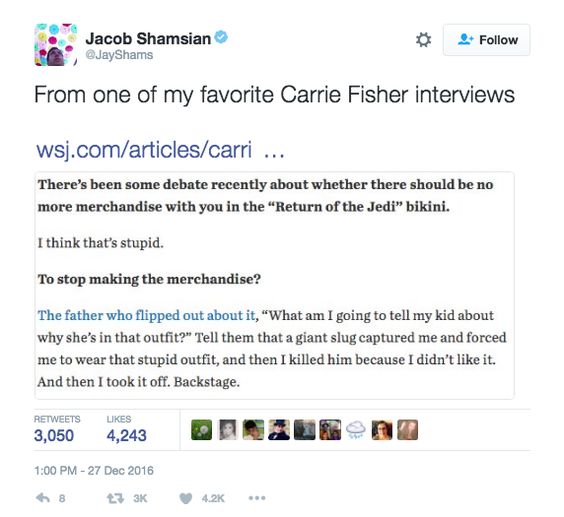
For the first time, I learned that princesses didn’t have to be damsels in distress. From Leia, I learned that princesses didn’t have to be weak, defined by their beauty and their ability to charm woodland animals. I learned that “happily ever after” didn’t have to mean marriage to a Prince Charming (who the Princess didn’t always know before falling in love with), where ultimate happiness isn’t defined as a romantic relationship with a man (instead, a woman could be strong and happy in her own right) and popping out pretty babies for sequels. Leia taught me that princesses didn’t always have to be saved. And, eventually, after years of hating the Disney Princesses (even Belle disappointed me by going in for technical bestiality and entering into a relationship with all the hallmarks of domestic abuse) and being uncomfortable with the whole “princess” thing in general, finding it something to be disdainful and ashamed of, Leia helped remind me that “princess” does not equal “weak”.
Buffy Summers, Buffy the Vampire Slayer. “Into every generation, there is a chosen one. One girl in all the world. She alone will wield the strength and skill to stand against the vampires, the demons, and the forces of darkness; to stop the spread of their evil and the swell of their numbers. She is the Slayer.” What a resume. Her job is to fight monsters and prevent the yearly apocalypse–and still somehow be a young woman with friends, family, and love interests.
“I’m the thing that monsters have nightmares about.”
–Buffy, BtVS S7 “Showtime”
Over the course of the show, she showed a lot of determination, even dying twice in order to stop evil and protect the people she loved. While her self-righteousness got irritating at times, Buffy–not to mention the other protagonists of both Buffy and Angel–helped teach me the value of doing the right thing, even when it all seems hopeless. A few encouraging words from the course of the show, with one from its spin-off:
“Strong is fighting! It’s hard, and it’s painful, and it’s every day. It’s what we have to do.”
–Buffy, BtVS S3 “Amends”
“The hardest thing in this world is to live in it. Be brave. Live.”
–Buffy, BtVS S5 “The Gift”
“There’s moments in your life that make you, that set the course of who you’re gonna be. Sometimes they’re little, subtle moments. Sometimes they’re not. I’ll show you what I mean… Bottom line is, even if you see them coming, you’re not ready for the big moments. No one asks for their life to change, not really. But it does. So, what are we, helpless? Puppets? Nah. The big moments are gonna come, you can’t help that. It’s what you do afterwards that counts. That’s when you find out who you are.”
–Whistler, BtVS S2 “Beginning: Part One”
“You have a choice. You don’t have a good choice, but you have a choice.”
–Buffy BtVS S2 “Lie To Me”
“Life’s not a song. Life isn’t bliss. Life is just this, it’s living. You’ll get along. The pain that you feel, only can heal, by living. You have to go on living.”
–Spike, BtVS S6 “Once More With Feeling” (bonus points for the fact that he’s singing this)
And then, this exchange, from Angel:
“What if I told you it doesn’t help? What would you do if you found out that none of it matters? That it’s all controlled by forces more powerful and uncaring than we can conceive. And they will never let it get better down here. What would you do?”
“I’d get this truck packed before the new stuff gets here. Wanna give me a hand?”
–Gunn and Anne, Angel S5 “Not Fade Away”.
There is another exchange, from the end of the Angel episode “Epiphany”. Earlier, Angel had saved another character, Kate, from her suicide attempt, and after realizing that the good fight is worth it even if there is no hope for some cosmic reward, Angel decides to impart some wisdom to bring Kate hope. This scene is famous for Angel’s line,
“If nothing we do matters, then all that matters is what we do.”
It’s an interesting line, which sums up the existentialist philosophy present in both this show and it’s parent series, and it’s preceeded by Angel’s declaration that the Powers That Be don’t care what happens on earth, that there is no grand plan or redemption. He continues by saying that the smallest act of kindness is, therefore, the greatest thing in the world. This part of the scene is what is most remembered and cited by fans of the show.
However, the part that’s overlooked is Kate’s response. She notes that he had an epiphany, but actually disagrees with him, saying that she doesn’t believe that people on earth are left to fend for themselves, that the Powers That Be do, in fact, care. When Angel asks why she thinks that, unable to understand that perspective for himself due to the things he has been through, this is her response:
“Because I never invited you in.”
Angel is a vampire. In the beginning of the episode, Kate was unconscious on the floor, having had a lot to drink and then choosing to swallow pills, but she wasn’t dead. There was no way Angel should have been able to get into her apartment; he should’ve been prevented from getting through the front door by the mystical barrier that keeps all uninvited vampires from entering private residences. And yet he ran right in, without hesitation, and got her into the shower to revive her. He shouldn’t have been able to do it, but he did.
Because the Powers that Be were watching. Because they cared. Because they had a plan for Kate, and for Angel. They bent the rules to allow Angel to save Kate’s life.
There is a point. There is hope. And we must never give up doing the right thing, no matter how bleak life can get.
The quote from Lie To Me is particularly important, because it contains the one part of existentialist philosophy I do agree with. In the episode, Buffy’s old friend from her school in Los Angeles comes to visit her unexpectedly in Sunnydale. All seems well and good at first, but her friend is shown leading a secret club of vampire-wannabes, people who romanticize vampires without understanding what it truly means to be one of the soulless undead. He also goes behind Buffy’s back to make a deal with Spike, who, at the time, is Buffy’s enemy, a vampire who has killed two previous Slayers and wants to kill his third, as well as find a cure for his sick lover, Drusilla. If Ford (Buffy’s friend) leads Buffy to Spike, Spike will make him a vampire. Buffy eventually realizes that Ford has betrayed her, but plays along, realizing that the secret club is nothing more than a sacrifice on Ford’s part, with her as the main prize: he has tricked them into believing that Spike will make them immortal and powerful, when really, they’re just lambs for the slaughter. The reason for all of this, Ford admits, is that he was diagnosed with brain cancer, which is slowly eating away at him. He is in pain, scared to die, and he knows that his death will be extremely unpleasant. He wants to become a vampire so that he will never have to die, and he is willing to do anything to achieve that immortality. He insists that he has no choice. He must become a vampire; there is no other option.
Hence Buffy’s response,
“You have a choice. You don’t have a good choice, but you have a choice.”
This highlights the notion of free will. Ford does have a choice, but he doesn’t understand that, and as his limited viewpoint has blinded him to other options, he has effectively robbed himself of other possible outcomes. In insisting that he has no choice, he has allowed himself to become a tool, a victim of circumstances. He has given up free will, has given up his own agency, and has resigned himself to being used, abused by whatever life throws at him. Buffy’s response that he does, indeed, have a choice, is to say that he does have free will, that he can make a different choice. Life has given him a sucky hand, but it’s up to him how he responds.
And that is a central theme of both Buffy the Vampire Slayer and Angel. Whatever happens to us, we have free will. We can choose to let ourselves be victims, or we can rise up and fight back. It’s all up to us. We can give up hope because things will never get better, or we can pack the truck. We might not always have a good choice, but we have a choice. Strong is fighting, hard, and we have to do it every day, but it’s in those moments when the chips are down that we find out who we are. The hardest thing in this world is to live in it, and living requires bravery.
In fact, here’s the full quote from “Amends”:
“Strong is fighting! It’s hard, and it’s painful, and it’s every day. It’s what we have to do, and we can do it together, but if you’re too much of a coward for that, then burn.”
In this case, for some context, Buffy is trying to convince Angel that the good fight is worth fighting, even when winning might not be possible, because evil always comes back. In this episode, a force called the First Evil (essentially the literal personification of evil, which is incorporeal and manipulates people by imitating the dead) has been manipulating Angel into committing suicide by taunting him with the crimes that he committed as Angelus. Angel is starting to believe that he will never find redemption, and that the best thing he can do is kill himself by waiting for the sunrise (again, the Powers That Be end up saving his life by making it snow so that the sun won’t come out that day). Buffy knows that Angel is a fighter, and is trying to convince him to keep going.
And, finally, here’s a quote that I left off the list above, from “Beginning: Part Two”, the season two finale of Buffy the Vampire Slayer. It’s one of the series’s most iconic pieces of dialogue, from one of the most significant scenes of the series, where Buffy is fighting Angelus, the season’s true Big Bad (sorry, Spike). Angelus is Angel without a soul, or possibly Angel’s split personality, unleashed whenever Angel loses his soul, as opposed to Angel himself when he’s not held back by the soul (the two shows differ in their presentations of Angel/us). Either way, Angel, due to the curse that gave him his soul back, loses that soul if he has even a single moment of pure happiness, something that Buffy didn’t know, and possibly Angel himself, until after he’d lost it following their night of passion (the metaphor for men revealing themselves to not be who the girl thought they were after they have sex made literal, by having the man actually become someone else). Angelus has made it his personal mission to destroy Buffy as a punishment for making Angel feel human (as well as have the world sucked into a hell dimension), and here, he’s got her isolated and is taunting her, preparing to break her emotionally before killing her:
“No weapons, no friends, no hope. Take all that away, and what’s left?”
And Buffy’s response, as she catches the sword blade between her hands with her eyes closed, is this:
“Me.”
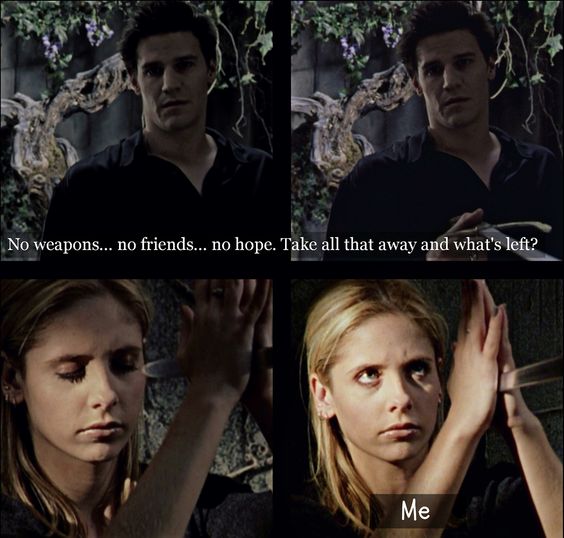
Deprived of her weapons, cut off from her friends, with no hope of saving her boyfriend and very little hope of actually saving the world that time, she still has herself. It’s a great, empowering moment, the acknowledgement of inner strength that has nothing to do with outside forces. The last thing anyone can take from you is yourself, and Buffy refuses to give up her identity even in the face of losing everything else.
However, I’d like to take the moment to restate the lesson learned from Kate, in one of the few scenes the character is actually tolerable. Because, while the theme of personal empowerment, as shown above, is incredibly important, let’s not forget that, after all, there is a plan and a purpose for life.
“Because I never invited you in.”
You are strong. Even when the world seems like it’s ending, when it seems like you’ve lost everything else, you still remain. And you have a choice to make. To give up, surrender, and become a victim of your circumstances, or be strong, rise up, and fight back. Give up hope, or dig in and do what needs done. Strong is hard, painful, and we have to do it every day, but it’s in those moments when things are at their bleakest, when we choose how we’re going to respond, that we find out who we are. We’re not helpless puppets, after all. The hardest thing in this world is to live in it, and living requires bravery. And remember that you are not alone.
Now, there’s one last quote from Buffy that I’m going to use here, this from the series finale, “Chosen”:
“Are you ready to be strong?”
This is how Buffy inspired me. She was not a perfect person. She made plenty of mistakes. Even lots of diehard fans have complained about her tendency to be insufferably self-righteous. She had to figure out how to be the Chosen One (eventually, one of the Chosen Two), how to be the Slayer, how to fight monsters and save the world, but still be a girl. She was still a friend, a daughter, a sister, and so she carried stakes in her purse and went slaying in high heels and skirts. She worried about college, about her future, about jobs, about how to raise her sister, and she was concerned about her love life. And the apocalypse, which usually seems to happen in May. She had to figure out how to retain her humanity even when her duty as the Slayer seemed to be turning her into nothing but a weapon. And with plenty of pitfalls along the way, she remained strong.
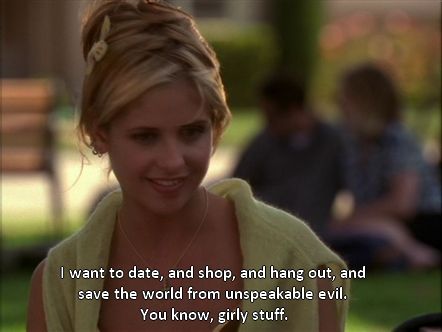
Oh, and both shows were heavy with the girl power. Gotta love that.
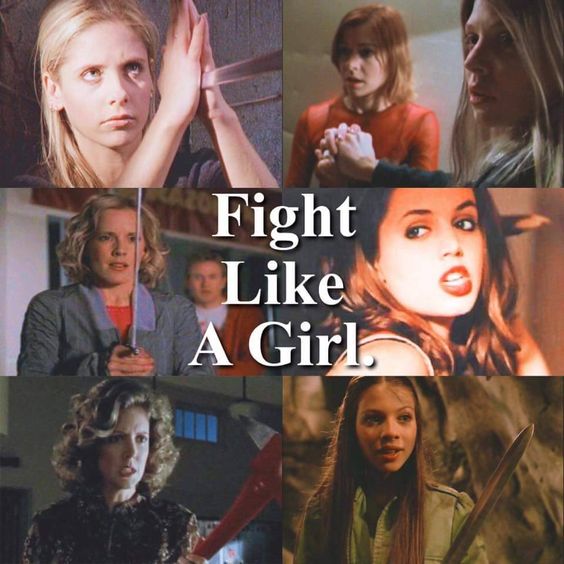
Eowyn, The Lord of the Rings. She is the reason I got into the series in the first place. As a kid, I wasn’t interested in some movie (because they were being released at the time) about a little dude and an old dude and Santa’s helpers destroying some evil jewelry. It was my Dad telling me repeatedly that he thought I’d like it that finally persuaded me to watch it, still convinced that it’d be boring and I’d hate it, but wanting to get him to finally stop talking about it. The scene he cited as his reason for why I’d like The Lord of the Rings was the scene from The Return of the King in which Eoywn kills the Witch-King, someone who was so confident that no one could kill him. Why? Because no man could do it. He knew it, and it never occurred to him that a woman might be on the battlefield. Perhaps, even, he understood “man” to be “person”, like how “man” is often used in our world to stand for “mankind”, giving him the idea that absolutely no one could kill him. But, terrified as she was, she stood up to him. She fought him. And we all know what happens.
He boasts,
“No man can kill me.”
And she takes off her helmet, letting her hair fall down around her shoulders, and proclaims,
“I am no man!”
And then she stabs him in the face, and kills him.
This, after everyone telling her that she couldn’t fight, that she couldn’t handle being on the battlefield. That war is only for men. Despite her protests that she is a good warrior, that she fears neither death nor pain, and asks–by proxy–why she can’t also fight for those she loves, everyone would have told her to stay at the camp. Everyone thought she had, except Merry. But she fights. She holds her own. She does as good as the men.
And she kills the one person on the battlefield that none of the big, strong men could kill. If she hadn’t been there, the Witch-King would have lived, and the final assault, the battle at the Black Gate, probably would have been over much quicker, with the heroes all dead. If she had listened to the men–who all meant well, I understand–they would probably have lost the war. Killing the Witch-King was something only a woman could do. Not even Gandalf could have done it, the White Wizard, the person who is essentially a lesser angel sent to Middle-Earth. Only a woman could have done it. She needed to be there. She proved that women could kick as much ass as men, and then she killed the most deadly enemy on the battlefield.
“I am no man.”
Her ability to do it laid in the fact that she was a woman. Her power in that instance came from the fact that she was a woman. Her presence was necessary in that battle. Without her, winning would have been so much more difficult, perhaps even impossible.
These three women are, at least in my perspective, three of the most influential women in fiction, because of how the works chose to portray them. They altered the way that women were presented in media. The Lord of the Rings was published in the 1950s, twenty years before the feminist movement began. A New Hope was released in 1977, during the first wave of feminism. And Buffy the Vampire Slayer first aired on television in 1997, one of the first widely recognized examples of a strong female lead. The entire main premise of the series was from a feminist perspective, playing with conventional horror tropes in general and starting with the trope that the (usually blonde) woman who runs from the monsters always gets killed by them.
Joss Whedon wondered, “What if the girl actually kicked their asses and killed them?” One of the biggest themes throughout the show, from its initial conception, was that of female empowerment. The Vampire Slayer is always a woman. Men can participate in the fight against evil, and they do–Angel, Spike, Oz, Xander, Giles, Wesley, Doyle, Gunn, Lorne, Riley (as much as we all hate his existence)–but they are never the Slayer. Vampire Slayers were created by men, and are overseen by men (the metaphors for the patriarchy are extremely apparent, such as in the season three episode “Helpless”) but they depend on women to save the world. The Watcher’s Council depends on the Slayer to give their lives meaning, because without her, what are they watching? Who are they overseeing? Buffy uses this power to her advantage in the season five episode “Checkpoint”, exploiting their need for her to their advantage, showing that she is the one who will call the shots because she is the one who is indispensable. And ultimately, it’s a woman–Willow–who uses magic to activate all Potential Slayers, leading up to the quote I used from “Chosen”:
“So here’s the part where you make a choice. What if you could have that power now? In every generation, one Slayer is born, because a bunch of men who died thousands of years ago made up that rule. They were powerful men. This woman is more powerful than all of them combined. So I say we change the rule. I say my power should be our power. Tomorrow, Willow will use the essence of this scythe to change our destiny. From now on, every girl in the world who might be a Slayer, will be a Slayer. Every girl who could have the power, will have the power. Can stand up, will stand up. Slayers, every one of us. Make your choice. Are you ready to be strong?”
“Make your choice. Are you ready to be strong?”
Buffy’s themes of choice/free will and empowerment come together perfectly in this quote.
Leia, Buffy, and Eowyn were all strong women, fighters, who stood up for what they believed and fought evil. Their gender was not an impediment–in fact, for Buffy and Eowyn, it was their strength. Leia was never shown to be strong because she was a woman–her gender was never given as the reason why she was a leader. However, despite that, all three women showed that they could be warriors, could be leaders and be a woman. Their gender did not get in the way of what they did, and what they did did not make them any less of a woman. Their gender and their duties were not mutually exclusive. They still wore cool outfits. They still had friends, family, and love interests. They were still feminine. But Leia was also a spy and a Rebel leader, Buffy was still the Slayer, and Eowyn was a swordmaiden of Rohan. They were not perfect people, but they never gave up.
They all chose to be strong.








